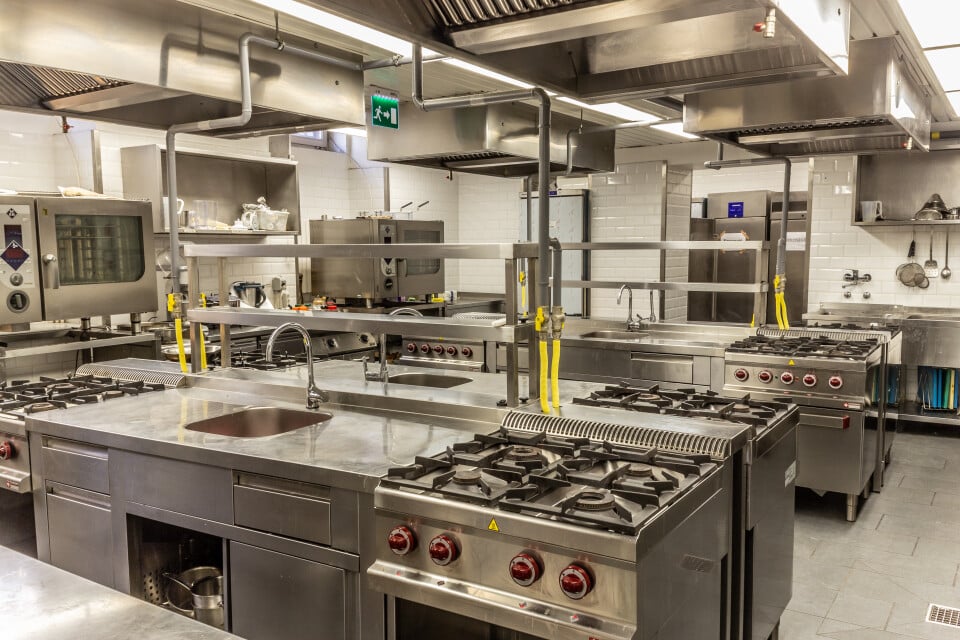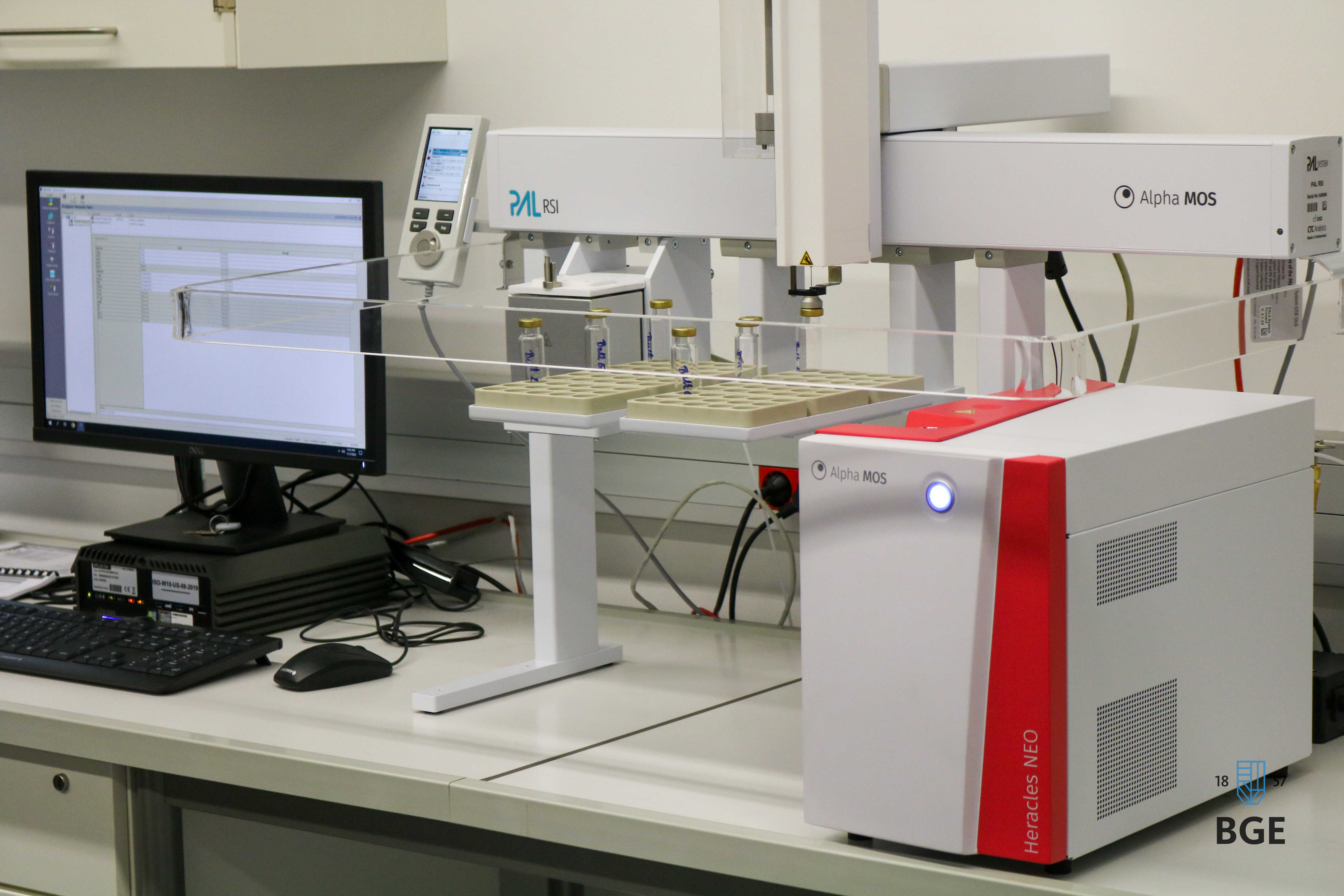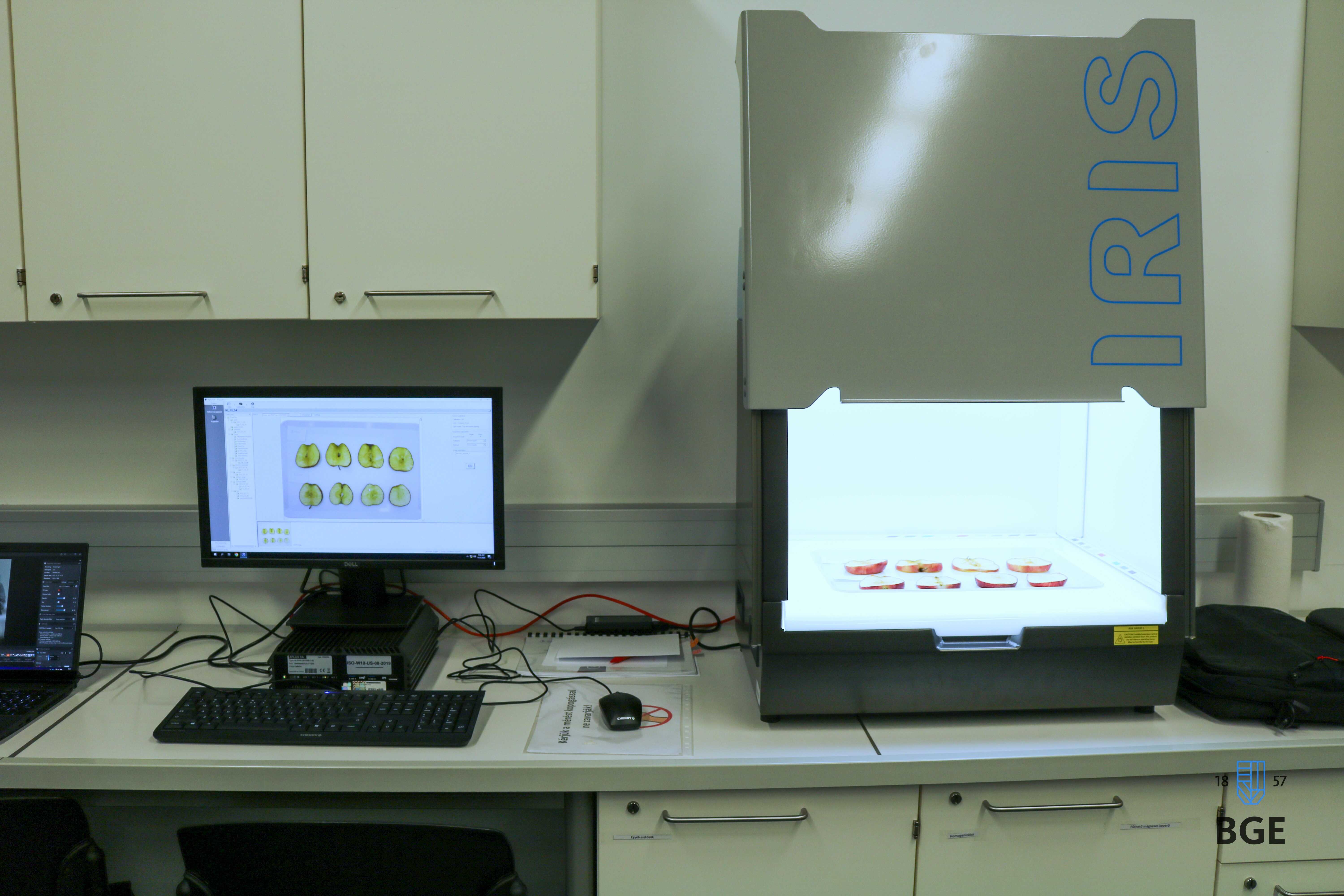In the Alkotmány Street building of the Faculty, there are educational restaurants, kitchenettes (Teaching Cabinet), student laboratories (food chemistry, microbiology) and a research laboratory, also in the Markó Street building, a sensory laboratory is available for teachers and students. There is library at the Faculty to enhance the work of students, lecturers and researchers, while the computer and educational technology requirements are served by modern systems, which are available in sufficient numbers.
The Training Cabinet of BUEB FCHT Department of Hospitality includes two kitchenettes and three educational restaurants, each unit has been renovated and is equipped to meet the technical needs of the age.
There are 12 workbenches in both of our kitchenettes, with industrial as well as domestic gas stoves and electric ovens in each work area. Both kitchens have combi steamers, thermomixes, paco-jetes, hold-o-mates, sous-vide pools, vacuum packers. Universal kitchen machines, kneaderes, ice cream machines, meat grinderes, cutters, microwave ovens, salamanders, ice machines, broken-ice machines, a dishwashers and hot sideboards are also standard equipment in the kitchens. In both kitchenettes, the necessary refrigeration and freezing capacity, small kitchen appliances, and all utensils are available, so it is possible to prepare a selection of food from a few to fifty servings.

The equipment of the educational restaurants is complete with elegant porcelain serving utensils, glasses for every type of drink, basic and special cutlery, and three flambé carts. The restaurants have built-in cooling capacities at the counter, in one restaurant students can tap beer, the other has a built-in glass washer machine. These appliances allow us to hold various types of sales practices, from basic to operating sales practices, organise events, organise wine, bartender and sommelier presentations, or brandy presentations and practice cooking in front of the customers The educational restaurants are equipped to practice the most complicated mode of service, the so-called silver service. Students can acquire barista skills on a two-arm Astoria coffee machine. All three restaurants are equipped with the special equipment that ensure that students acquire a high level knowledge of the various devices and a high degree of mastery of their usage during the practice sessions.
The Faculty's nutritive material laboratory is well-equipped for classical and state-of-the-art laboratory tests, having 16 modern workstations. The laboratory has been designed keeping in mind the necessary conditions, so in small groups students can each perform a separate task. In the laboratory, we deal with the examination of the quality-determining properties of foodstuffs, which include both sensory, chemical and instrumental tests. The research laboratory also has special instruments suitable for measuring lactose and dry matter content, freezing point, density, general and meat pH, and colour determinations.

The microbiology laboratory has a modern work surface designed for the orderly and safe working of 16 students at a time. The laboratory contains the best known and most important bacterial strains of foodborne illnesses in Hungary. Students learn the basic microbiological techniques (plating, plate casting, inoculation), get an overview of the structure, movement and shape of microorganisms, for which they use independent binocular light microscopes.

The research laboratory of the Faculty was inaugurated in September 2016. It is equipped with state-of-the-art machinery, software, and modern work surfaces. Our objective is to conduct precise and professional gastronomic engineering food examinations, to analyse data from tested food items using advanced instruments, to reveal relationships between measurements, to visualise measurement data, and to compare and evaluate the results.
The research laboratory offers numerous analytical instruments for those interested in research, including a spectrophotometer, texture analyser, and colorimeter. Our key research instruments include the Tobii eye camera, the shape and colour analyser IRIS e-eye, and HERACLES NEO e-nose. The Tobii Pro Glasses portable eye camera enables on-site measurements, making it highly applicable in the hospitality and tourism industry. The Tobii Pro Fusion desktop eye camera is used under laboratory conditions to examine the impact of visual stimuli on decision-making, supplemented by the application of other influencing factors.
The shape and colour analyser device, i.e. the electronic eye (e-eye), is suitable for the visual monitoring of the various deterioration and degradation processes, as well as examining changes in shape and colour. The electronic nose (HERACLES NEO e-nose) device is designed for analysing volatile compounds in our foods, with which it is possible to detect the aroma of the ready meals, the deterioration processes and the presence of microorganisms, among others.
Besides, it allows us the examination of the aromas of food combinations and the product development processes.
Our devices are exceptionally applicable in the hospitality industry, as they enable the determination of several sensory and nutritional parameters (colour, shape, form, smell) from the prepared dishes in kitchens.
The sensory laboratory (Sommelier Room) is there to educate the students on a variety of alcoholic and non-alcoholic beverages as well as other products consumed for pleasure (coffee, tea, honey, spices, etc.). The collection of wine bottles on the two sides of the Sommelier Room in the former laboratory of Professor Öveges, displayed in heritage listed storage cabinets, is open to professionals. The room allows standard sensory evaluation by 16 judges. The Sommelier Room is a well-ventilated room, protected from direct sunlight, with artificial lighting, providing an objective and undisturbed assessment area, suitable for sensory evaluation of alcoholic and non-alcoholic beverages and other foodstuffs, like those consumed for pleasure (coffee, tea, herbs, etc.) and of course, it also has the tools to carry such evaluations out. The room has several wine coolers, which can promote the professional storage of wines, the preservation of their quality, and their favourable development, which can be monitored during practice sessions. In addition to wines, similar indepth tests can be carried out in the case of beers, spirits, liqueurs and non-alcoholic beverages.

The Faculty and Tourism Library of the Faculty of Commerce, Hospitality and Tourism at BUEB, provides a unique opportunity for tourism and hospitality professionals to access literature, in addition to meeting the needs of students, teachers and researchers.
From the academic year 2024/25, the new faculty collection will combine the libraries with a strong professional tradition in one location.
The collection includes the most important related textbooks, in addition to the required and recommended literature for the subjects taught at the faculty. As a national library for tourism and hospitality, it aims to collect all the literature in Hungarian.
It offers valuable, rich online resources and traditional books for the readers, as well as information and cultural needs.
The most requested services are: information, help with databases, computer with internet access, printer, photocopier and scanner. The library area is also connected to the university wifi network.

In addition to traditional library services, the University also subscribes to a number of internationally recognised journal and book databases. These databases are available to BUEB faculty instructors and students with VPN access.
The Internet connection for FCHT is provided by the Informatics Development Agency (KIFÜ) with a data transfer speed of 1 Gbit/s. Wi-Fi is available in all buildings of the Faculty, including the dormitory. All built-in and mobile devices on the Faculty have an Internet connection within a regulated framework. There are seven computer rooms available for teaching computer science and other computer-intensive subjects, where we have installed software and professional software packages for higher education as part of the state-of-the-art Microsoft Campus Agreement program. A user environment supporting multilingual education and examinations has been created in each computer room. The virtual collaboration space between students and faculty is provided by the CooSpace application, including multimedia tutorials and electronic exams. Almost all lecture and teaching rooms in the Faculty have a multimedia system (projector, PC, interactive whiteboard), where presentations, video playback and Internet content can be displayed even from mobile devices (tablet, telephone, etc.).


